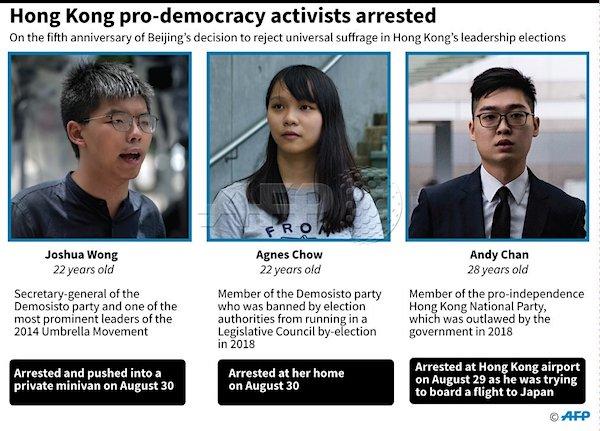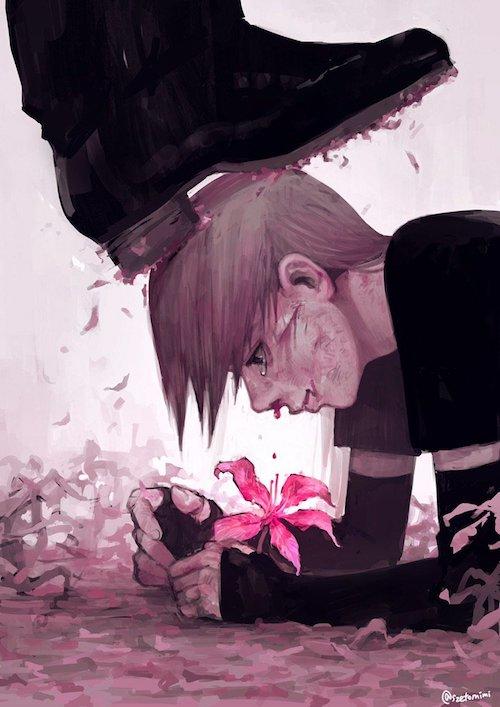Authored by Raul Ilargi Meijer via The Automatic Earth blog,
Of course the notion of addressing Hong Kong has been in my mind for a while, but it’s a bit of a moving target: things change all the time, and seemingly on the fly. However, with today’s fresh developments, it seems silly to wait any longer. Hong Kong Civic party lawmaker Dennis Kwok yesterday expressed the reason way better than I could:
As I said time and again, the use of troops in Hong Kong will be the end of Hong Kong, and I would warn against any such move on the part of the central people’s government.”
He said that before yesterday’s arrests -and subsequent release on bail- of a handful of alleged protest leaders Joshua Wong, Andy Chan, and Agnes Chow. Who, if you read between the lines, didn’t lead much of anything; they may be figure-heads, but that’s not the same thing. The protests are either lacking leaders or everyone’s a leader, depending on who you ask. So why arrest them to begin with? You tell me.
What I did find enlightening was Reuters’ report yesterday on Beijing having rejected Hong Kong Chief Executive Carrie Lam’s (how is CEO a political function?) proposal to communicate with the protesters and perhaps allow some concessions to their demands. I know it’s only one source, but it appears quite feasible.
Carrie Lam is between a rock and a hard place, and she admits it -at least according to the Reuters piece-, though not to the protesters. Beijing is in exactly such a spot, but won’t admit it, ever. And that right there is Hong Kong’s main issue.
China Rejected Hong Kong Plan To Appease Protesters
Earlier this summer, Carrie Lam, the chief executive of Hong Kong, submitted a report to Beijing that assessed protesters’ five key demands and found that withdrawing a contentious extradition bill could help defuse the mounting political crisis in the territory.
The Chinese central government rejected Lam’s proposal to withdraw the extradition bill and ordered her not to yield to any of the protesters’ other demands at that time, three individuals with direct knowledge of the matter told Reuters. China’s role in directing how Hong Kong handles the protests has been widely assumed, supported by stern statements in state media about the country’s sovereignty and protesters’ “radical” goals.
Beijing’s rebuff of Lam’s proposal for how to resolve the crisis, detailed for the first time by Reuters, represents concrete evidence of the extent to which China is controlling the Hong Kong government’s response to the unrest. The Chinese central government has condemned the protests and accused foreign powers of fuelling unrest. The Foreign Ministry has repeatedly warned other nations against interfering in Hong Kong, reiterating that the situation there is an “internal affair.”
Why the extradition bill, which would have allowed for people to be extradited from Hong Kong to the mainland was ever proposed, g-d only knows. Remember, the transfer of control over the city to China is still 28 years away. Why do it now? It was obvious all along it would meet with fierce resistance.
Blindness or blinders in the Politburo? Quite possible, it’s not as if those guys typically get out much. It’s just that they’re taking a giant risk, because as Dennis Kwok says, “the use of troops in Hong Kong will be the end of Hong Kong”. What he means, and Beijing surely understands, is the end of Hong Kong’s status as a trade and finance center.
Not a trifle matter for sure. Hong Kong has built that status over a long period -that happens in fields where trust is so crucial-, much like the City of London and Wall Street. You can break that down in no time, but you can’t rebuild the trust elsewhere in anywhere near that timeframe, it takes many years.
China has major plans to ‘move’ and/or ‘share’ Hong Kong’s financial and trade ‘qualities’ to/with neighboring Macau and Shenzhen, but it’s nowhere near ready to make that transition.
Remember, Hong Kong has its own dollar, the HKD. That’s not going to move to the mainland, not even in 2047. China only have the yuan, which is quite useless for international trade and FX.
Alors, what are we going to do about it, guys? On the one side, you have Beijing, which tried to push through the extradition bill and got it thrown back in its face with interest. But Beijing is allergic to losing face. On the other side you have the protesters, who realize this is now or never, that if they give in now, their freedom(s) will never come back.
Two immovable entities, but Beijing seems to think they can move this, that they have the upper hand. Do they, though? 7.5 million people live in Hong Kong, a fair amount of whom are below the age of 10 or above the age of 75. So the 1.5 million that were already out on the streets in some of this year’s protests added up to a quarter of the population. That’s a lot of people.
Sending in troops would hurt China’s economy something real bad, because it would mean the end of the Hong Kong trade hub (corporations, banks, rich people would leave). And most of the population understand the now-or-never notion. I read somewhere that though 92% of the people are ‘Chinese’, only 11% call themselves that.
The vast majority ‘identifies’ as Hong Kongers. And (perceived) freedom is a big part of that. Many of those Hong Kongers are young and highly educated, salaries are high (finance sector), they can travel freely, study abroad. Those who are older are often the parents of these young people, who’ve worked very hard to give their kids these options.
There have been -and will be again- protests from groups of doctors, lawyers, finance professionals, you name it. They don’t want to run the risk of being picked off the streets by mainland Chinese soldiers OR by Hong Kong police forces instructed by Beijing.
When/If things get down to the wire, Hong Kongers will prove very much to be an immovable force. They have too much to lose not to be. They have, in their own view, everything to lose (which some people would translate as nothing to lose, but meaning the same). And they’re up against a Politburo that reacts to them like it’s never left the early 1900s.
This does not bode well for anyone, and if g-d forbid it comes down to serious fighting in the streets, it will bode ill for the entire world. Not only China depends on Hong Kong for much of its trade, the US and EU do, too, for their trade with China, from which they procure much of what is sold in their stores.
High time for everyone to sit down and talk. If there’s still time. The mass protest scheduled for tomorrow, August 31, may have been ‘officially’ called off, but there’s no proof Hong Kongers will stay home because of that. There IS proof of more military movements just across the Hong Kong border in Shenzhen, however.
Pre-emptively arresting and releasing a pair of 22-year-old kids may not do the job anymore for Beijing. But the Communist Party CCP thinks they cannot possibly lose. They may be wrong. 1.3 billion people is a mighty potential force, but it’s not always only about numbers. Sometimes it’s about now or never.
To me, personally, it feels like what is needed is for the CCP to modernize. But its very structure is set against that. It appears to be this inertia-laden colossus attempting to rule the 21st century with 100-year-old ideas. And yes, they’re talking about shutting down the internet in Hong Kong.
But that would mean shutting down the banks and trading houses too. As would sending in the tanks. According to the 1990s transition treaty signed with the UK, Beijing has until 2047 to fully incorporate Hong Kong. It may not go down smoothly then either, granted, but why push it today?
The West, the EU, UK, US -Putin even?!- can easily come up with a proposal for meetings on Hong Kong to be held over the next 28 years until 2047 that would allow Beijing to save face today. Let’s get it done, soon, win everyone involved some time, they all need it. We need it. And 28 years is plenty time. Before we inadvertently land in another Boxer War or Opium War or WWIII.
via ZeroHedge News https://ift.tt/2ZCqiz9 Tyler Durden

